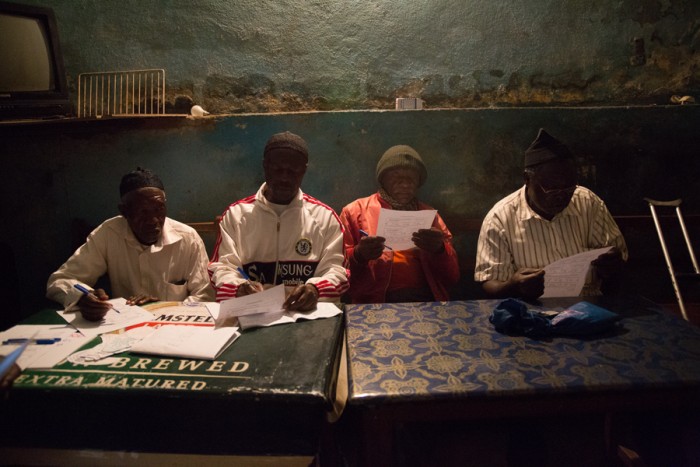February 26th, 2016 by Rachel | Tags: Disability, Peace Corps, Women | No Comments »
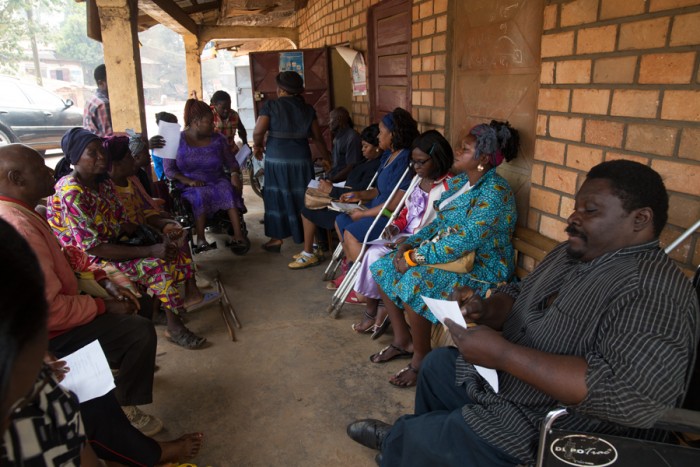
On February 14, in honor of Valentine’s Day, I hosted a Men as Partners activity by asking two disability groups, Helping Each Other and Northwest Association of Women with Disabilities, to come together and participate in learning about gender inequality in the disability community. The activity we conducted was called “Fishbowl.” During the first half of the activity, women were asked questions relating to women’s issues and their life as women. Men were required to listen and were not allowed to speak. During the second half of the activity, we reversed. Men were asked questions relating to women’s issues and their life as men. Women were not allowed to speak and they were required to listen. At the end of the activity, everyone had the opportunity to share their thoughts on what they learned from each other. I relied on the handbook that Peace Corps provided us, “Engaging Boys and Men in Gender Transformation: The Group Education Manual” to conduct the “Fishbowl” activity.
Prior to the day of the activity, I asked the president of Northwest Association of Women with Disabilities, Ruth, who is also my counterpart, to inform her members to bring their husband or boyfriend to the activity. At the activity, I noticed that no women brought their husband or boyfriend. I asked how many of them have a husband or boyfriend and some raised their hands. I asked why they didn’t bring one. They didn’t respond although one said that her husband is out of town. After the activity was conducted, I asked Ruth why did they not bring their husband or boyfriend. She said almost all of them are not married. The ones who claim that they have a boyfriend, they don’t really have a boyfriend. It’s just a man with who they enjoy a company from time to time, and the man has relationships with other women. This situation shows that for women with disabilities, being in a relationship is a huge challenge for them. As I have said in the past, according to a study, only 5% of women with disabilities in Cameroon are married while 50% of men with disabilities are married. Majority of the men with disabilities who were present at Men as Partners are married.
I started off the “Fishbowl” activity by asking “What is the most difficult thing about being a woman in Cameroon?”
One woman who is actually married responded by saying that women are expected to do household work such as clean the house, do laundry and cook. She said that she want to be able to manage finances and have rights to earn money.
The next question I asked was, “What do you want to tell me that will help them better understand women?” The same woman who is married and another woman both responded by saying that they want men to participate in household chores and they want to be able to manage finances too. One of the women added that she also want to be able to be independent and have her decisions and opinions taken into consideration.
When I asked, “What do you find difficult to understand about men?” The women agreed that the most difficult thing to understand about men is their attitude. Men see themselves as higher than women.
I then I asked them “How can men support and empower women?” One woman emphasized again that they, women, want men to help them with cooking, cleaning, laundry and taking care of children so that they can work too. She also repeated that they want to have a greater role in finances.”
When I asked “What rights are hardest for women to achieve?” women not only shared their challenges as women but also as women with disabilities. One said, “For women with disabilities, it’s being able to get employment, get education and own a property of land.”
To get insights about their childhood life as girls, I asked them “What do you remember about growing up as a girl in Cameroon? What did you like and not like about being a girl?” One who is not married and is not in a relationship with anyone shared that she grew up with an expectation that girls were expected to get married and have children when they grew up.”
Another woman added a challenge that they faced which is that families took so much care of them that they were not able to be independent when they grew up.
As a last question, I asked, “Who were your positive male role models?” Two women said their fathers were their positive role models because they made sure that they got education while growing up. Another one said, “My foster father because he was always available to take care of the family and was so respectful to his wife”
At this time, I switched gears and asked men questions.
The first question I asked men was, “What is the most difficult thing about being a man in Cameroon?”
One man said that his greatest difficulty is facing the high expectation of brining money to the home.
When I asked the following question, “What do you want to tell women to help them better understand men?” One man said that men have sexual desires and they want sex. Another said, “Men have ego.”
I then asked, “What do you find difficult to understand about women?” One of the responses was that women ask a lot of questions.
In order to help empower women, I asked “How can men support and empower women?” Some of the men agreed that helping them with cooking, laundry, cleaning and be involved in their children’s schooling is the way to go. They also agreed that supporting women in their jobs would help too.
When I asked, “What do you remember about growing up as a boy in Cameroon? What did you and not like about being a boy?,” interestingly, one shared his bad memories of being bullied because he was disabled. Right after he shared his experiences, I asked everyone, “How many of you were bullied in school as children.” Almost everyone raised their hands.
The same person shared his experiences of being bullied said that he also had great memories which included enjoying playing outside.
Then for the last question, I asked “Who are some of the positive female influences in life?”
One man who was there to assist his sister who has a disability said that his sister is his role model because she has shown him what women with disabilities are capable of doing. Another man said it was his teacher and another said it was his mother.
I also administered a pre- and post-test which included six questions about various equality issues and gender roles. The responses were very interesting. On the pre-test, six out of 20 participants agreed that changing diapers, giving the kids a bath, and feeding the kids are the responsibilities of a woman only. However, on the post-test, every single one disagreed. On the pre-test, four, one man and three women, agreed that if a woman betrays a man, he can hit her. On the post-test, all responded by circling “I disagree.” On the pre-test, five women and one man circled “I agree” under the question, “If someone insults me, I will defend my reputation, even if it means using violence.” On the post-test, all except for one woman circled, “I disagree.” On both pre- and post-test, all disagreed that it is okay for a man to hit his wife if she will not have sex with him. On the pre-test, half agreed that it is the woman’s responsibility to avoid getting pregnant. On the post-test, four woman circled, “I agree.”
At the end of the workshop, I asked everyone to share their thoughts on sharing their feelings about gender roles and equality. They responded that they appreciated having a safe space to discuss their feelings and learn about other’s feelings.
February 22nd, 2016 by Rachel | Tags: Food, Peace Corps | No Comments »
Food is everything we are. It’s an extension of nationalist feeling, ethnic feeling, your personal history, your province, your region, your tribe, your grandma. It’s inseparable from those from the get-go. – Anthony Bourdain
Wherever I traveled in the world, I always found a McDonald’s. I saw a McDonald’s in the town center of Cusco, Peru. I saw one next to the Pantheon in Rome. I saw one on Champs-Elysées in Paris. I bought a milkshake from McDonald’s in Athens. I saw a few in Costa Rica. I saw too many McDonald’s to count in China. So, it just occurred to me that I haven’t seen McDonald’s anywhere in Cameroon. I haven’t even seen one in Yaounde, the capital of the city. I googled to see if there is one in Douala, and there isn’t one. That means it doesn’t exist in Cameroon. There are actually no fast food restaurants in Cameroon. No KFC. No Burger King. No Dominos. Nothing.
So, how do Cameroonians get their fast food? In Cameroon, there is no such a thing as drive throughs. However, there is still a system where people can still get food delivered right into the car. This system is called “street food.” There are often people on the sides of the road selling food such as sliced watermelons, peeled oranges, bananas, grilled corn, peanuts, and baton de manioc (starch paste inside a wrapped leaf). Drivers will often stop and passengers will stick their hands out the windows to hand money to the vendors and get the food. The passengers will then often eat the food in the car. These street food vendors are actually frequently found by police check points and pay tolls because cars are always stopped there giving street food vendors an easy opportunity to really sell the food to passengers.
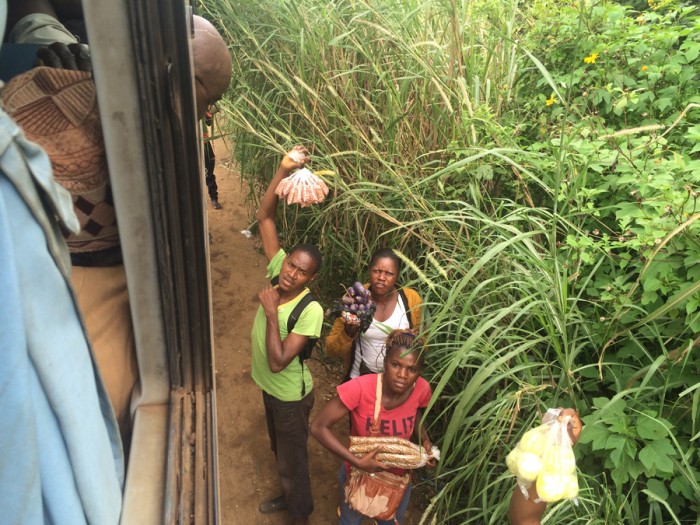
In the city of Bamenda, I also often find many street food vendors sitting on sidewalks grilling fish, beef on sticks and plantains. People will walk by them, buy the food and eat them on the go. There are also many vendors walking around in town with huge plates of food sitting on top of their head. People can just approach those vendors and buy the food on the spot.
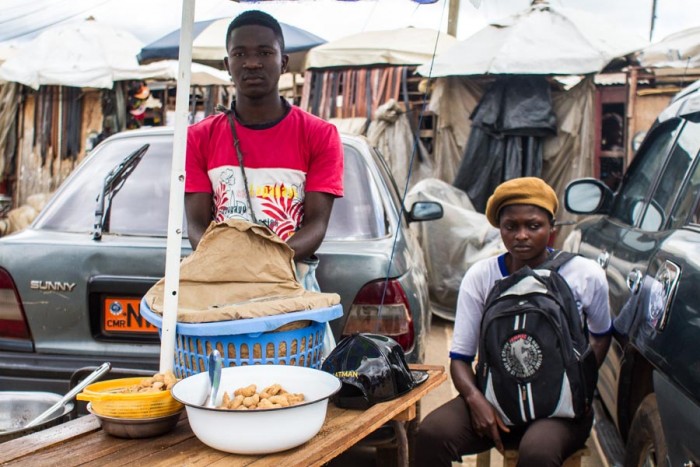
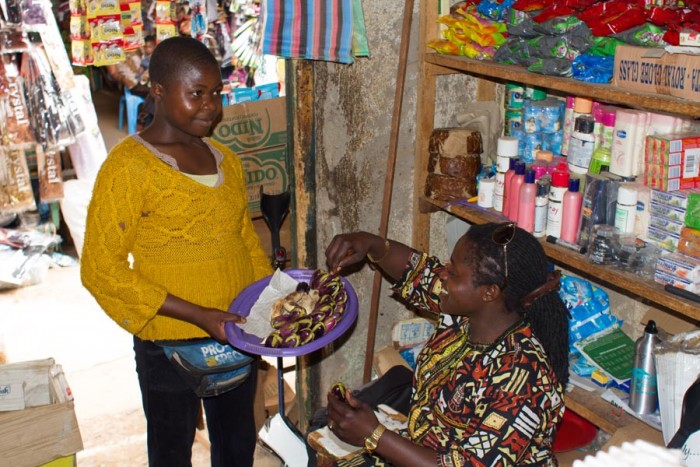
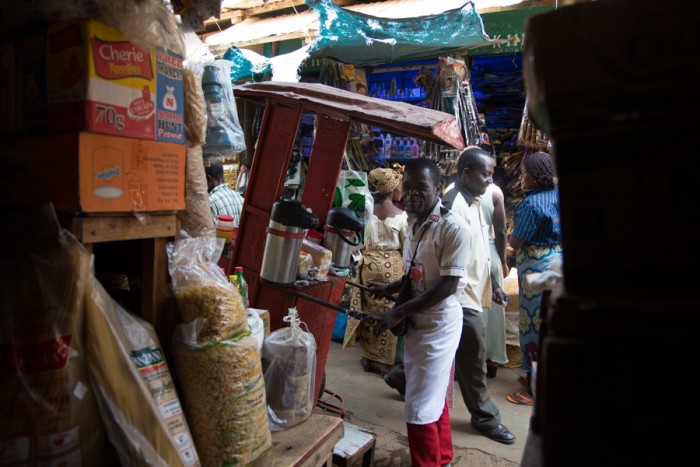
This situation is also the same in villages. In the center of villages, people will often find vendors selling fresh grilled fish, beignets, and fried plantains.
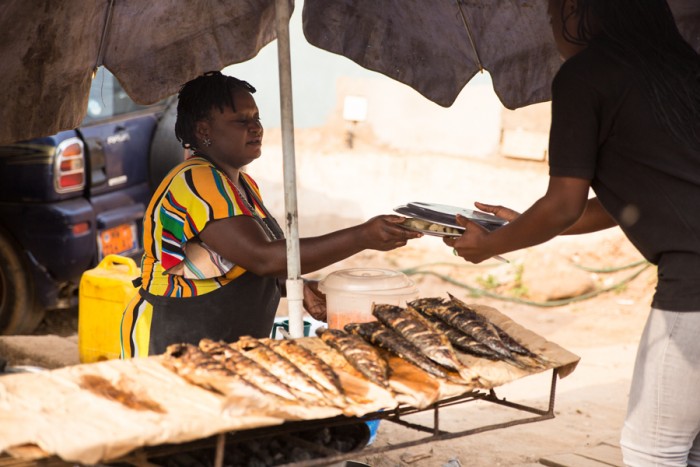
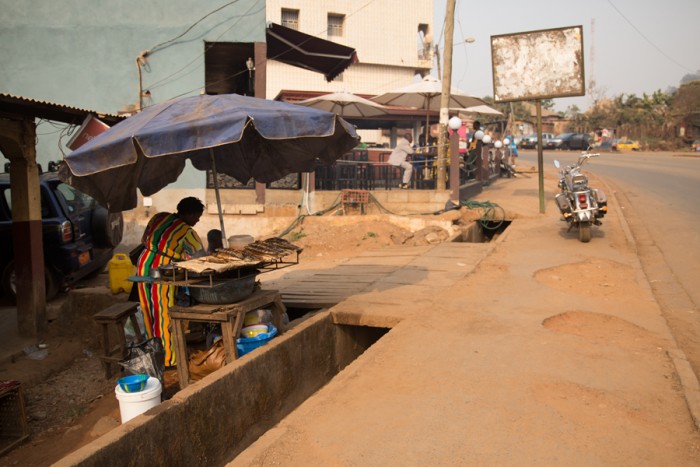
So while McDonald’s and any other fast food chains may not exist in this country, Cameroonians do still have their own way of getting food instantly.
February 13th, 2016 by Rachel | Tags: Peace Corps | 2 Comments »
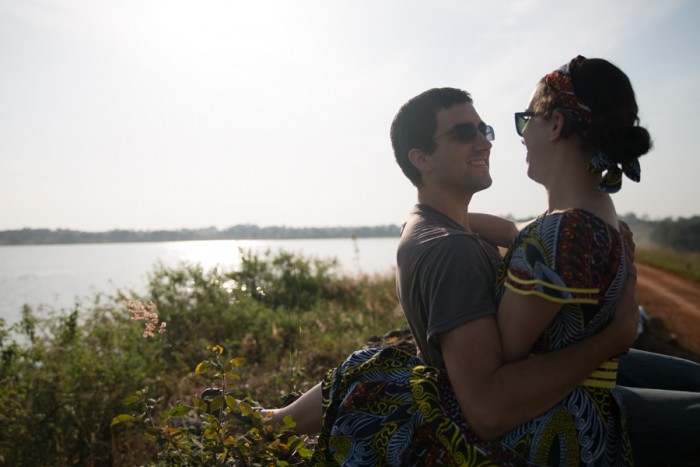
I’ve got to see you again
I could almost go there
Just to watch you be seen
I could almost go there
Just to live in a dream– From I’ve Got to See You Again by Norah Jones
Love life. It comes with both joys and challenges. When I first submitted my application for Peace Corps, I completely stopped dating and avoided falling in love with new guys. I didn’t want to deal with a long distance relationship. I didn’t want it to complicate my service. I frequently heard that one of the number one reasons volunteers early terminate their service is because they missed their loved ones at home.
On my first day of service, at staging in Philadelphia, a man came in my life unexpectedly. We sat at the same table and chatted throughout the day. He was very charming and had a very handsome smile. We quickly became very close friends. Our friendship eventually evolved into a relationship.
Even though we are in the same country, we are placed in completely different regions. We’re so far away from each other that it takes three days to get to each other’s posts. We can’t blame Peace Corps for the distance because we both made very specific posts requests. I asked to be placed in the Northwest region so that I could work with a specific disability organization. Alex requested to be in the francophone region so that he could use his French speaking skills. We got our requests and are forever grateful for it. It is really ironic that while I would fall in love with someone who is living in the same country, I would still find myself being in a long distance relationship.
We have no regrets about where we are posted even though we do sometimes say that we wished he was posted in a village in the Northwest just so that we can be close. We still love our job so much. Being far away is perhaps sometimes for the best because it allows us to give all of our energy to our communities and focus on collaborating with the locals on various projects.
But we also say that if we were closer, we could have worked together with the locals on so many projects and make an even bigger impact. It is often frustrating when we come up with great project ideas to do together, often times, the distance impedes us from doing them or makes it harder for us to accomplish them. To quote one of my work partners, “You do great work. But when you and Alex work together, you make an even bigger impact.” We’re often inspired by Bill and Melinda Gates, Mark Zuckerberg and Priscilla Chan, Bill and Hillary Clinton, and Carrie Hessler-Radelet and Steve Radelet, couples who work together to make positive impacts on the world.
While I face challenges at work such as bridging the understanding in cultural differences between the Americans and Cameroonians with the people in my community and meeting their needs to help improve their lives, living far away from the significant other has been posing a much greater challenge than I could imagine. When saying goodbye to him after spending days together, it feels like half of my soul has walked away. Goodbyes are always the worst, and I’m not going to deny that I have cried. The worst is when I have to take off by train and see him disappear from the window. It does really suck being so far away from each other. For a few days after we say goodbye, I quietly mope although it’s probably not so quiet as my work partners will ask me, “So when will you see him again?”
Getting together in Cameroon is not as simple one may realize. We have only 48 days of vacation total for two years. We don’t get work days off on the weekends. We both so strongly believe in maintaining good work ethics that clandoing (traveling without approval) is not an option for us. We both signed up to give our communities two full years of service. Our communities fully expect us to spend a wealth of time working with them, and we cannot let them down. We want to maintain a good balance of our personal life and professional life.
In the meantime, we are doing our best to use our vacation days wisely by spreading them out throughout the service so that we can try to see each other every couple months for at least a few days. We talk to each other on the phone or FaceTime every single night. We use this time to share about our days, happy, sad, exciting and angry moments, and ideas for our work.
And when we are together, the time is very special as we treasure every minute of our moments together. We enjoy every second of laughing, hugging, holding hands, having conversations in person and inspiring each other to make positive contributions to the world.

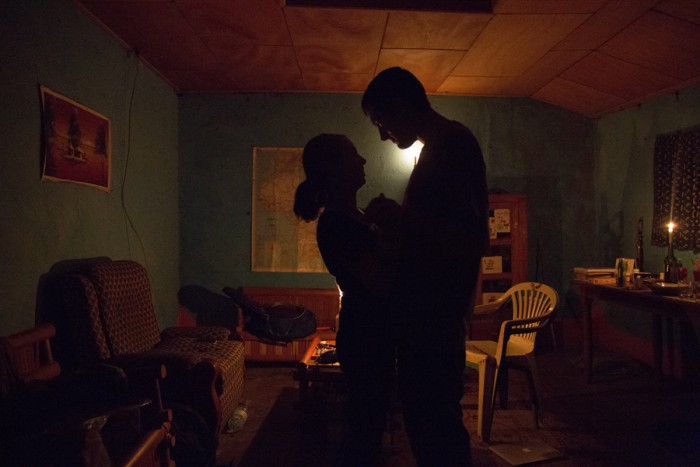

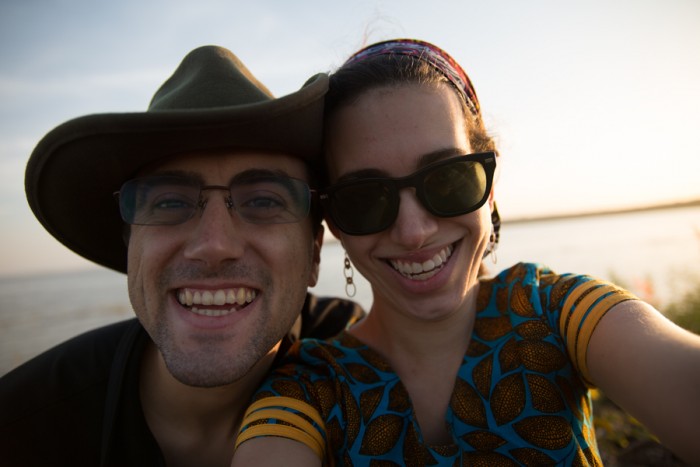



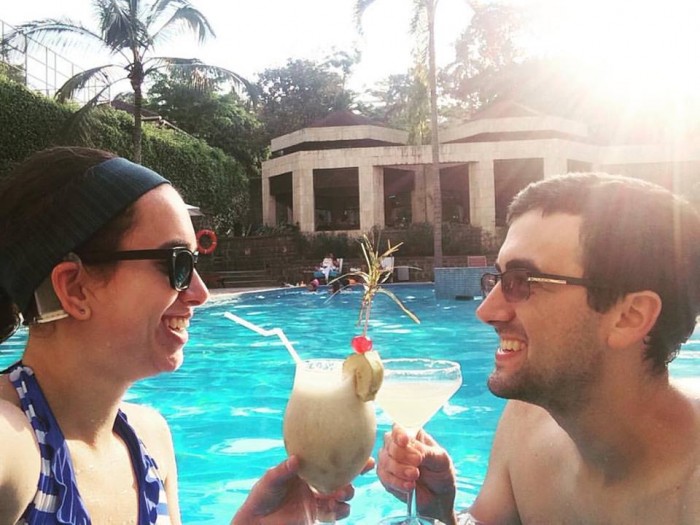

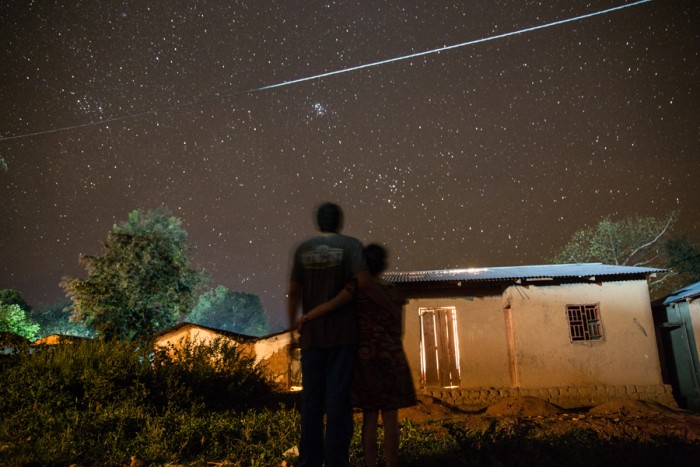
February 9th, 2016 by Rachel | Tags: Disability, HIV/AIDS, Peace Corps | No Comments »
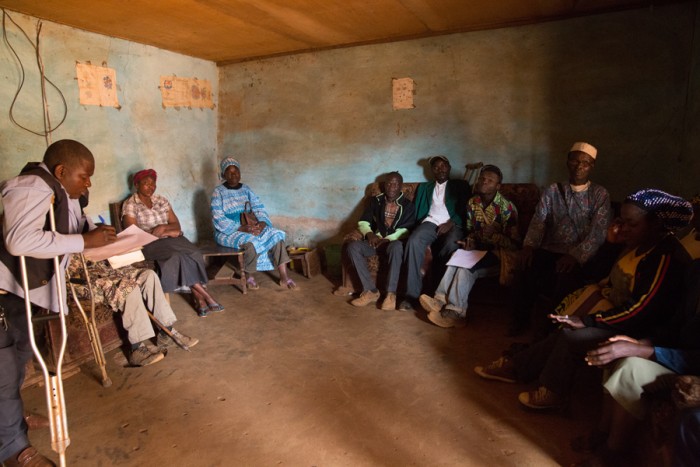
To continue my mission to educate as many persons with disabilities as possible about HIV and AIDS, I took a trip to Bali, a village located about 15 minutes by car from Bamenda. In Bali, I met with a group of 12 persons with disabilities to give an education on HIV prevention.
Before I began the presentation, I asked the group, “Who has learned about HIV before?”
“I don’t know anything about HIV,” one woman in the group shouted.
“That is why I am here. You will learn about it now,” I said.
I gave a one hour presentation on HIV prevention which included translation by the president of the group from Grammar English to Pidgin.
As I recalled from the results of pre- and post-tests from the previous HIV Presentations, about 33% of the participants from the presentations showed on the post-tests that they still believed that one can become infected with HIV from sharing clothes and/or hugging someone who is infected with HIV. Thus, in this presentation, I clarified with everyone that HIV and AIDS cannot be transmitted by sharing clothes or hugging by emphasizing the word, “NOT.”
“You canNOT become sick with HIV by sharing clothes,” I told the group.
Like most previous HIV Prevention presentations, I administered the pre- and post-tests. Because I have learned from the results of the previous post-tests on what people still did not understand or learn from the presentations, I made some modifications in this presentations. As a result, the results came out better this time. Eight out of 12 people scored 100% on the post-test. Two missed only one answer and one missed only two answers on the post-test.
On the pre-test, one scored 44% and three scored 33%. On the post-test, one of them achieved 89% and other three of them achieved 100%. This meant that they have really benefited from the presentation.
Only three people in the group showed prior to the presentation that they were already well informed about HIV/AIDS by achieving 100% on the pre-test.
Those who could not read the tests due to low level of literacy and/or visual impairment received assistance from those who could read well and read out loud the questions and answers to them.
The same woman who shouted, “I don’t know anything about HIV,” asked me at the end of the presentation, “Why do we have to learn about HIV?”
“How many of you here have finished school,” I raised my hand, “Actually, who has been to secondary school?”
Two out of 12 people raised their hand.
“Ok, so most of you have either been to only primary school or never been to school, right?,” I asked.
People nodded.
“Only 2% of persons with disabilities receive education in Cameroon. This means that most of you have been denied access to education and never had the opportunity to learn about HIV/AIDS. HIV/AIDS is an epidemic disease. It’s important for you to learn how to prevent from becoming infected with HIV/AIDS so that we can end the disease,” I said.
January 29th, 2016 by Rachel | Tags: Disability, Peace Corps | No Comments »
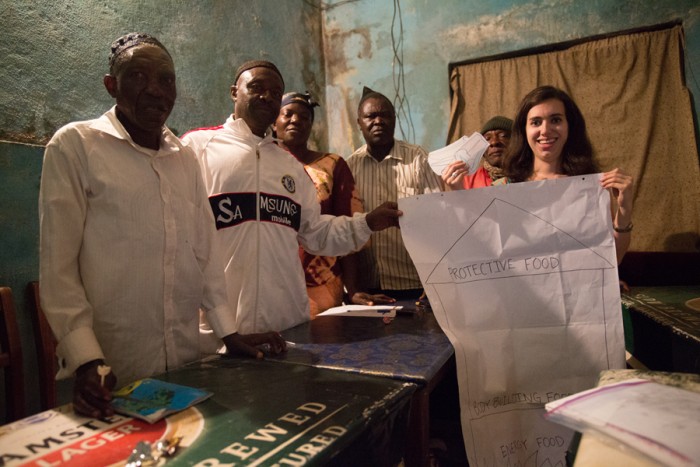
Last October, I did a Nutrition Workshop for a small group of persons with disabilities. When doing workshops on various health topics, I normally give each workshop more than once so that I can reach out to as many people as possible. However, for this workshop, I did it only once because the workshop produced unsatisfying results that led me to decide not to give anymore workshops until if I could come up with a solution that can produce better results.
Nutrition was a very complicated topic to educate. The goal of the workshop was to improve participants’ knowledge of how to eat good well-balanced and healthy meals. When I did my community needs assessment a year ago, I found that about two-thirds of all people who I interviewed do not eat well-balanced diet regularly. This means that the majority rarely or never eat vitamins and minerals which includes fruits and vegetables and many also rarely eat proteins such as meat, fish, beans or dairy. Everyone reported that they always eat carbohydrates, which is the primary staple of their diet. Carbohydrates include yam, potatoes, plantains, cassava, spaghetti and bread. Financial reasons is one of many factors as meat is often unaffordable for many persons with disabilities who are unemployed or struggle to earn money. Access to food is another reason. Many persons with disabilities in particular those with mobility and visual issues cannot go far due to the distance from their home to the market being too far. Many taxi drivers will not take persons with disabilities because they do not want to make the effort to assist them in getting into the car. Also, many markets are inaccessible to those who are in wheelchairs due to narrow aisles. Also, most of those who are deaf cannot communicate with the vendors to negotiate the prices. Another main reason is also because of lack of knowledge. For example, in Bamenda, bananas, mangoes, avocados, onions and tomatoes are plentiful but for some persons with disabilities who have the ability to go to the market or have family members who go to the market for them, fruits and vegetables are just still not part of their regular diet.
At the workshop, I educated the participants on the importance of eating well-balanced diet meals and eating food from all three categories: carbohydrates, proteins and vitamins and minerals. I presented the “Food House” which is similar to the food pyramid. I explained to them how each type of nutrients such as carbohydrates, proteins and vitamins and minerals impact our body. I explained what happens to our body when we eat or do not eat food from each type of nutrients. I shared various diseases that we can develop as a result of not eating food from one or more of the categories We did a hands on demonstration where I presented cut outs of various food and asked the participants to place each food in each category on the poster of “Food House.”
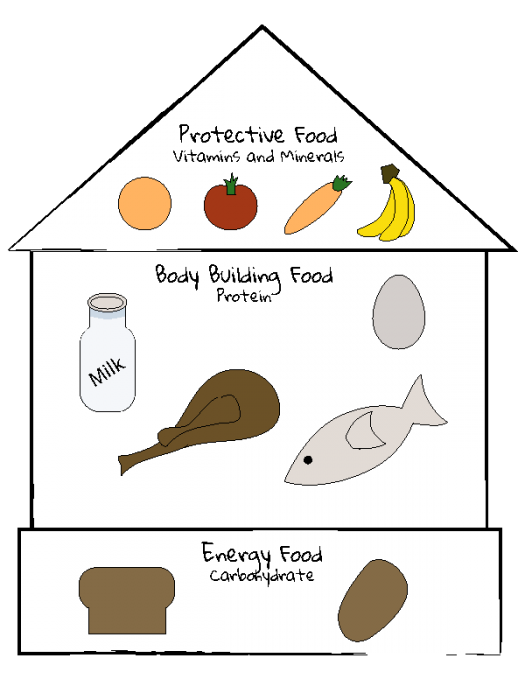
When doing the demonstration, the participants exhibited struggles in being able to identify how each food impacts our body. Then when they did the post-test, while they were able to define correctly each different types of food, carbohydrates, proteins and vitamins and minerals, they were not able to correctly identify which food belongs to which category. Also, none of them except for one correctly responded that they must eat food from all three categories in order to maintain a well-balanced diet.
Because the post-tests showed no improvements from the pre-tests and participants exhibited struggles in understanding the information, I decided that it is best not to move forward in giving more nutrition workshops to other groups until I can figure out how I can improve in educating people about nutrition and figure out the best approach in helping them understand the information. I realize that using complex vocabulary terms and scientific information to a group of people who have received little to no schooling is challenging. Thus, I need to figure out how I can help them understand the necessary complex information.
